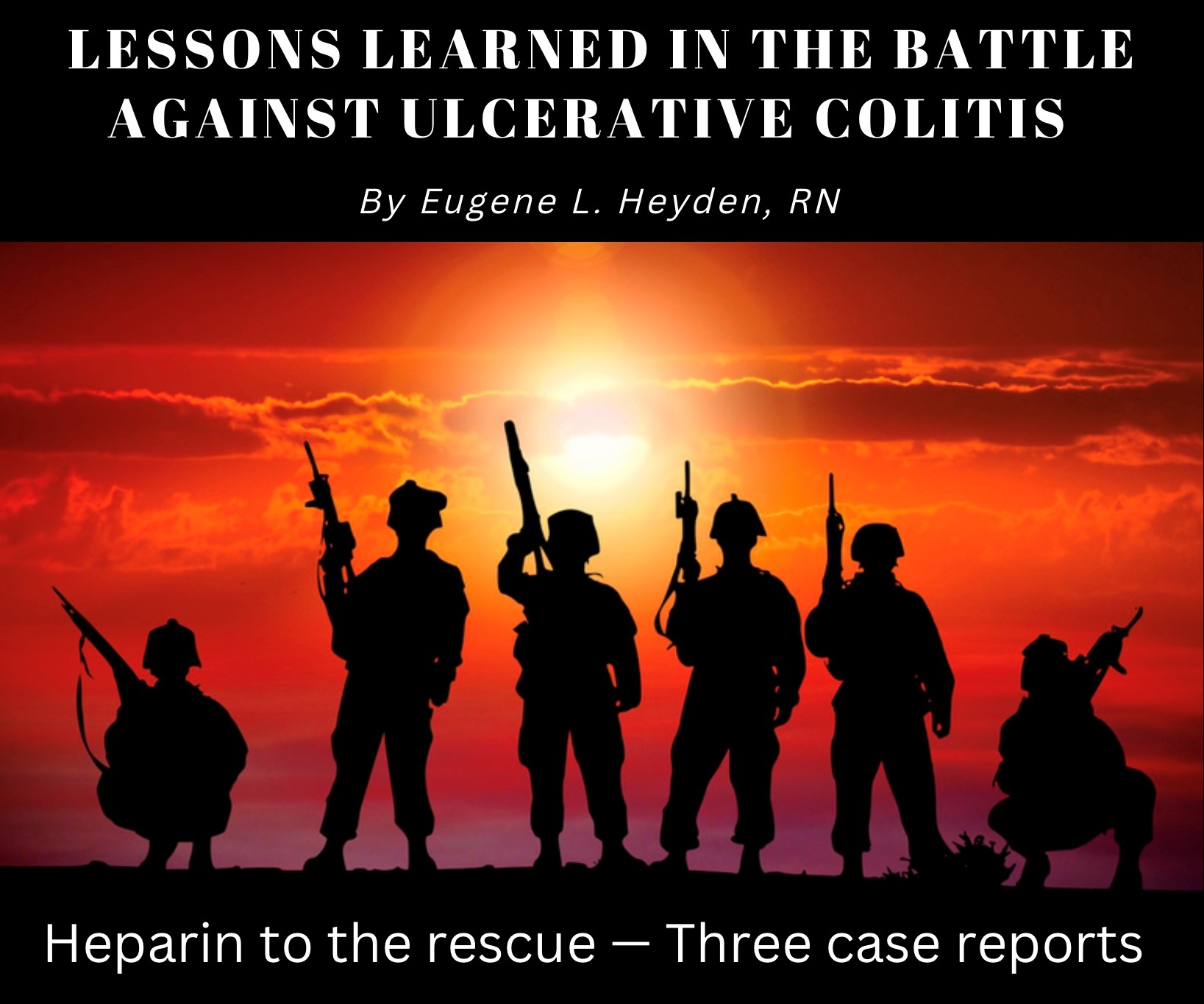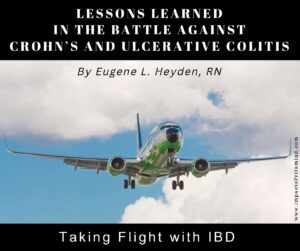By Eugene L. Heyden, RN
“Heparin is emerging as a promising therapy for inflammatory bowel disease.” ~ Korzenik, 2000
“Hypercoagulable state may be an important contributing factor in the pathogenesis of IBD, especially ulcerative colitis (UC).
“Apart from its anticoagulant effects, there are several studies which have shown that heparin possesses various anti-inflammatory and immunomodulatory properties . . ..” ~ Mousavi et al., 2015
Let’s get right to the case reports. Prepare to be amazed! (Or at least somewhat impressed.)
Case report: Harold
For the past 6 years, Harold has been battling ulcerative colitis. He is now 74. A recent rectal biopsy revealed active, chronic proctitis. “His colitis was refractory to prolonged treatment with sulfasalazine and prednisolone, and he was passing four to six bloody stools per day.” That is until fate would step in.
For reasons unclear, Harold developed a blood clot in his leg, a condition known as deep vein thrombosis (DVT). Treatment requires anticoagulation, typically with heparin. Accordingly, upon admission to the hospital for management of DVT, “He was treated with a small dose of intravenous heparin (3000 U every 4 h), gradually increased to 6000 U every 4 hours.”
So, how did it go?
“After 8 days the patient announced that his colitis had “gone”, he had no rectal bleeding, and he “hadn’t felt better in years”. On day 14, the rectal mucosa was normal. He was discharged on warfarin [an oral anticoagulant]. One month later he was passing frequent bloody stool, his colitis had returned. And warfarin was stopped. 2 months later he presented with a pulmonary embolism [clot to the lung], and was again treated with heparin. After 6 days his colitis had settled.” (Gaffney et al., 1991)
End of story.
“This surprising initial observation lead [sic] to an open-labeled series of 10 patients, nine of whom were in remission by week 6, with average time to improvement seen in approximately 3 weeks.” (Korzenik, 2000)
Next, we’ll review two of the 10 study participants in the following two case reports.
Case report: Joann
Joann is 25 years old. And for the past 12 years she has been battling ulcerative colitis. Upon inspection, her rectal mucosa looked inflamed, as one would expect. And, she is passing 3 bloody stools per day. Her therapy, sulphasalazine and intermittent steroids, is not keeping things under control. Furthermore, “She had developed a rectal stricture, and resection was imminent.” However, “She was reluctant to have surgery and was offered a trial of heparin.”
After informed consent was obtained, “she was started on 5000 U intravenous heparin every 4 h. After two weeks, she was discharged to self-administer 10 000 U heparin subcutaneously twice daily.” Just a guess, but I believe Joann was pleased with the outcome. Her doctors, too.
“Within 7 wk on heparin and sulfasalazine, her colitis was in remission, and her stricture ceased to tighten. She was maintained on heparin and sulfasalazine for 3 yr without recurrence.” (Gaffney et al., 1995)
Case report: Franklin
At 35, Franklin is a complete and total disaster. His ulcerative colitis is so out of control. “Intensive therapy with sulfasalazine and steroids failed to improve his serious condition, and he became mortibund [near death].”
Too bad all this occurred before the era of the biologics. Perhaps a biologic could have prevented the unfolding tragedy. And as long as I am speculating, too bad Franklin didn’t have this book to read. If he had, he might have adopted one of the outstanding diets featured and lived happily ever after. But let’s get real (and back to our story).
Due to the severity of his disease, surgery was offered but Franklin “adamantly refused.”
Not wanting to lose Franklin, and given the promise of heparin, this option was offered. The offer was accepted. Informed consent was obtained. It was a go!
Heparin was started at 3000 U I.V. every 4 h, then slowly increased to 7000 U I.V. every 4 h. Sulphasalazine was continued. And to the delight of all, soon after the initiation of heparin, stool frequency reduced to 4–5 per day and with less blood to report. The rest is history.
“After 2 months, sigmoidoscopy showed the mucosa of the rectum and lower sigmoid to be mildly inflamed with no ulcers. The patient was discharged in February, 1990, to self-administer heparin subcutaneously at home. In early March he was passing only 3 stools per day, and there was mild inflammation of the rectal mucosa.” (Gaffney et al., 1991)
In conclusion:
No doubt, Harold, Joann, and Franklyn all received great benefit from heparin. You, too, may want to benefit from heparin. However, one roadblock may be a study conducted by Zezos et al., published in 2006. In a study of thirty-four active ulcerative colitis patients, this team of investigators came to the following conclusion: “Adjuvant administration of low-molecular heparin in patients with active ulcerative colitis is safe and well tolerated, but no additive benefit over standard therapy for ulcerative colitis was noted.” (Zezos et al., 2006) Perhaps this report put the damper on the use of heparin as a conventional therapy for IBD, and interest in heparin for this purpose faded. But should you read this study, or a study by others that seem less than enthusiastic about the use of heparin in IBD, please don’t forget about Harold, Joann, and Franklin. All three benefited greatly from heparin, and quite impressively, heparin pulled Franklin out of the grave.
Let’s end with this:
“Although it is well established that genetic predisposition and immune dysregulation play key roles in IBD pathogenesis, clinical experience and bench research have clearly demonstrated that, in both forms of IBD, a hypercoagulable state and a prothrombotic condition exist, while coagulation abnormalities are an intimate part of the IBD clinical picture.
“Because it is clear that the clotting system is potentially involved in IBD pathogenesis and/or in perpetuating and amplifying the inflammatory process, the use of anticoagulant or coagulation-related drugs can be considered for the treatment of IBD.” (Danese et al., 2007, emphasis added)
So, let’s do something about the “hypercoagulable state” in IBD . . . for those in need. Should we ignore it, someone could get hurt. It looks like heparin, could be the ticket, here. But then there is bromelain (see post immediately below).

Related posts: (Click image to view)
References
Danese S, Papa A, Saibeni S, Repici A, Malesci A, Vecchi M. Inflammation and Coagulation in Inflammatory Bowel Disease: The Clot Thickens: CME. Official journal of the American College of Gastroenterology| ACG. 2007 Jan 1;102(1):174-86. https://journals.lww.com/ajg/abstract/2007/01000/inflammation_and_coagulation_in_inflammatory_bowel.29.aspx
Gaffney P, O’LEARY J, Doyle C, Gaffney A, Hogan A. Response to heparin in patients with ulcerative colitis. Lancet (British edition). 1991;337(8735):238-9. https://www.thelancet.com/journals/lancet/article/PII0140-6736(91)92201-C/fulltext
Gaffney PR, Doyle CT, Gaffney A, Hogan J, Hayes DP, Annis P. Paradoxical response to heparin in 10 patients with ulcerative colitis. American Journal of Gastroenterology. 1995 Feb 1;90(2). https://openurl.ebsco.com/EPDB%3Agcd%3A13%3A18337981/detailv2?sid=ebsco%3Aplink%3Ascholar&id=ebsco%3Agcd%3A16061296&crl=c
Korzenik JR. Heparin: An emerging, counterintuitive therapy for inflammatory bowel disease. Current Treatment Options in Gastroenterology. 2000 Apr 1;3(2):95-8. https://link.springer.com/article/10.1007/s11938-000-0001-3
Mousavi S, Moradi M, Khorshidahmad T, Motamedi M. Anti-inflammatory effects of heparin and its derivatives: a systematic review. Advances in pharmacological sciences. 2015 Oct;2015. https://www.hindawi.com/journals/aps/2015/507151/
Zezos P, Papaioannou G, Nikolaidis N, Patsiaoura K, Papageorgiou A, Vassiliadis T, Giouleme O, Evgenidis N. Low‐molecular‐weight heparin (enoxaparin) as adjuvant therapy in the treatment of active ulcerative colitis: a randomized, controlled, comparative study. Alimentary pharmacology & therapeutics. 2006 May;23(10):1443-53. https://onlinelibrary.wiley.com/doi/full/10.1111/j.1365-2036.2006.02870.x
DISCLAIMER: This article is offered solely for informational purposes. The information contained therein and opinions expressed should be evaluated for accuracy and validity in the context of opposing data, new information, and the views and recommendations of a qualified healthcare professional, and not to be substituted for professional judgment and guidance or to provide a reason to neglect or delay appropriate medical care for self or for others. It is the reader, and reader only, who bears the responsibility for any actions that could be construed as being a response to the information presented. The statements and opinions expressed by the author have not been reviewed or approved by the FDA or by any other authoritative body, nor is the author endorsing any product or specific therapy mentioned. This article and the opinions contained therein are offered to the reader to broaden his or her understanding of the issues discussed and to help identify options that may be suitable for the individual to pursue, on behalf of self or others, under approval and direction of a qualified physician or medical team member. All questions of a medical nature which arise from reading this article should be directed at qualified health care professional. There are no guarantees that a suggested website and internal links are safe to visit or open or are currently available.
Copyright © 2024 Eugene L. Heyden, RN
All Rights Reserved

DISCLAIMER: The book excerpts and articles featured on this website are offered solely for informational purposes. The information contained therein should be evaluated for accuracy and validity in the context of opposing data, new information, and the views and recommendations of a qualified health care professional, and not to be substituted for professional judgment and guidance or to provide a reason to neglect or delay appropriate medical care for self or for others. It is the reader and reader only who bears the responsibility for any actions that could be construed as being a response to the information presented. The statements and opinions expressed by the author or authors of the information provided on this website have not been reviewed or approved by the FDA or by any other authoritative body, nor is the author endorsing any product or specific therapy mentioned. The book excerpts, articles, statements, and opinions are offered to the reader to broaden his or her understanding of the issues discussed and to help identify options that may be suitable for the individual to pursue, on behalf of self or others, under approval and direction of a qualified physician or medical team member. All questions of a medical nature which arise from the book excerpts and articles available on this website should be directed at qualified health care professional.













